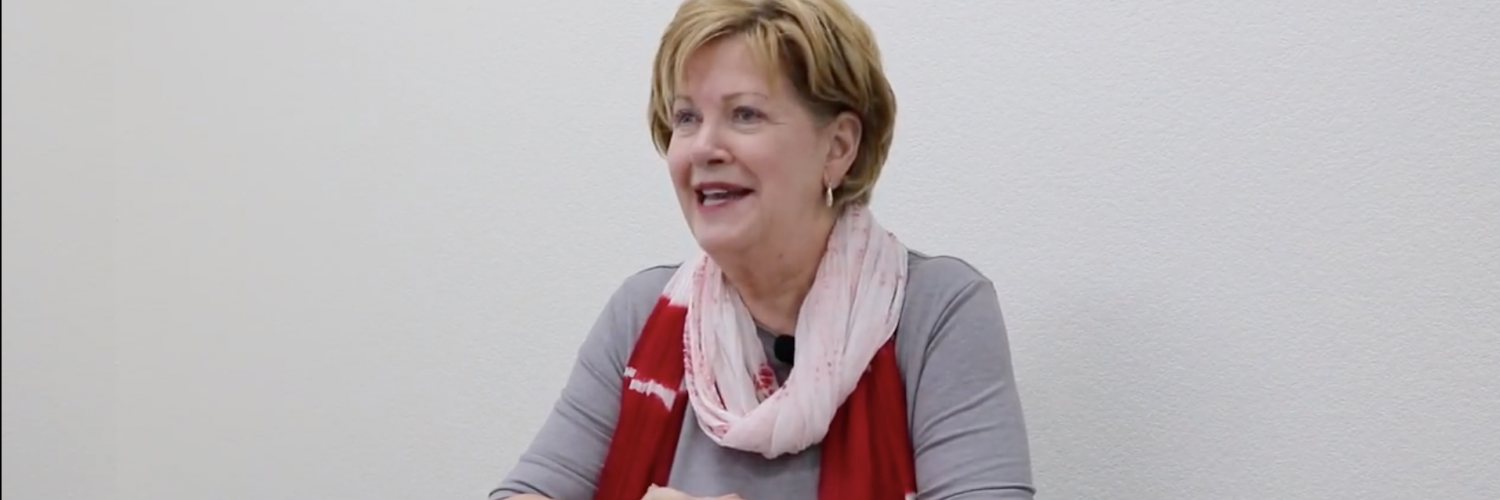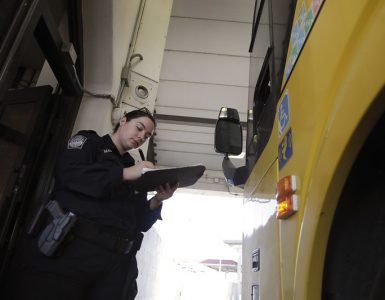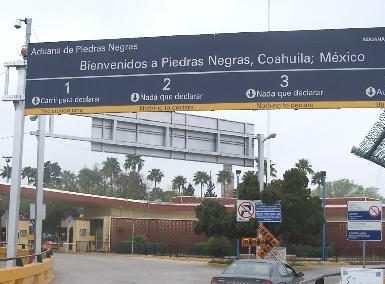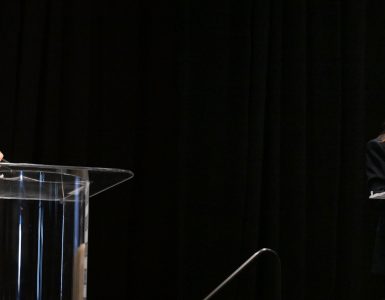Throughout her career in state government, Gail Lewis has been heavily involved with the Arizona-Mexico Commission. Lewis is the Arizona Department of Transportation director of P3 initiatives and a special advisor to Director John Halikowski for international affairs. One of her favorite memories with the AMC is the friendships she’s made along the way.
Question: What is your title?
Answer: I work for the Arizona Department of Transportation. I am the director of P3 Initiatives and I’m a special advisor to the director for international affairs.
Q: What is your professional background?
A: I have worked in state government for most of my career. But always, a constant in my life has been the Arizona-Mexico Commission. I started with them a long time ago when I first came into state government right out of graduate school. My master’s degree is in international affairs, so I was very interested when I came back to Arizona to try and find some way to use that interest and expertise. And so, I found the Arizona-Mexico Commission quite quickly and they found me, and it’s been a long and happy relationship. I have been involved with the Commission working for a couple governors, staffing them on Mexico and trade issues. I continued that work when I was at Arizona State University, I was the director of economic development. And, I again, sort of cemented ASU’s relationship with the Arizona-Mexico Commission at that time, which has continued for all these years. And then, when I came back downtown in state government first in the governor’s office and then for ADOT, I was able to continue to do that border work and stay active with the AMC. So, it’s always been a part of my state government history as long as I’ve worked in state service.
Q: What is your current involvement with the AMC?
A: I help to staff my boss, John Halikowski, who is the director of ADOT. I help to staff him on all of his work with the Arizona-Mexico Commission. He co-chairs the transportation and infrastructure committee. So, I help develop the agenda for those meetings, I staff him at the specific meetings and then in between times I try really hard to make sure we accomplish what we said we were going to accomplish. Whether that is work in improving safety between Arizona and Mexico, improving commerce. Or, whether it involves helping collaborate with the federal government to make sure that ports of entry are functioning and working well, to make sure Arizona gets its share of federal money for ports of entry and to try and help resolve any issues that may arise. Our border communities are very dependent on the ports of entry for their day-to-day livelihood. If there are issues with the ports of entry, with the federal government where ADOT can be helpful, we try and be helpful and I consider that all part of our relationship with the Arizona-Mexico Commission.
Q: Why do you think the work the Arizona-Mexico Commission does is important for Arizona?
A: I can see a real change over time at how Mexico is recognized as being a valuable and important partner for Arizona. The trade relationship, the tourist relationship, the back and forth between family members, the constant flow of commerce- I have just seen how that has come to mean more and more to the state’s economy as the years have gone by. And when NAFTA was first passed 25 years ago, I think that’s really what kicked it off. But, I’ve seen it just snowball- grow and grow and grow- over the years. And, transportation is a critical part of making that happen. There’s not much trade if there aren’t trucks going back and forth across the border. And, when those trucks get into Arizona they have to have a place to go. They have to be able to go from that border port of entry to wherever the trade takes them. Sometimes it’s within Arizona, but often it’s outside of the state. ADOT provides that vital connectivity that makes sure that commerce really moves beyond the border itself and deep into the U.S. and back and forth across to Mexico. So, I think ADOT has a really important role to play in that and the fact that our trade has continued to grow, and those numbers have just expanded exponentially. I think part of that is because of that tight relationship between ADOT and the Arizona-Mexico Commission. And, the fact that we have a really deep understanding in this agency now of how important Mexico is to our commerce and to our highway connectivity, and I think the fact that is now well-known, well-understood, well-acknowledged and thought of when we’re planning a highway system I think has just made a huge difference.
Q: How have ADOT and the AMC worked together to improve transportation between Mexico and Arizona?
A: I think for a long time in the past probably connectivity with Mexico was kind of an afterthought. It was really just back and forth between the border communities or when people from Arizona would go down to Rocky Point and vacation, it was a pretty casual thought. As the value of trade began to grow and grow and grow, and Arizona has Mexico as its largest trading partner by an order of magnitude. As that became recognized, the commercial side of the Mexico relationship became really important to us at ADOT. And, along with that came the recognition that these trucks that cross the border, the minute they get off the federal port of entry, they’re on our system. And, the recognition that those trucks need to be able to move throughout the state, throughout the country using the border as their starting point for their trip into the U.S. All of the sudden, that became critically important. So, as ADOT realized how important that was, a lot more attention got paid to the aspect of crossings that contributed to the economy of the state. So, I think commercial crossings, truck crossings and also passenger vehicles for tourism purposes- all of the sudden that became very important and ADOT began to recognize that and pay a lot more attention as we develop our own long-term plans that connectivity to Mexico became an important part of what we consider. Right now, for example, we have a procurement on the street to improve State Route 189 in Nogales, which is the connector highway that connects the port of entry to Interstate 19. That project has been on the books for a long time but it really came together at last, partly because of the relationship that the state now has with Mexico, the understanding of how important that is and frankly the relationship now that the people in the community in Nogales have with ADOT leadership. They know each other personally now. People in the border communities- they can call me, they can call the director, they can talk to the State Transportation Board. They have those relationships now and a lot of that has come as a result of the AMC. So, now you’re no longer just making decisions on a spreadsheet, you’re making decisions because people you know and trust have come to you and expressed the importance of these projects. And so, I think that is a lot of the reason that they have risen in importance to the agency and we’ve been able to prioritize a lot of those projects.
Q: Why is it important for Arizona to focus on maintaining and continuously build a relationship with Mexico?
A: We now live in a global economy and even though there sometimes has been some political pushback to that, it’s a reality and it’s a reality that’s not going to change [and] it’s not going to go backwards. It’s very important now for Arizona to really focus on our global connections and since Mexico is our largest trading partner and since Canada is our largest private investment partner. It’s really important that North American access stays really strong and solid and the Arizona-Mexico Commission is a critical part toward making that happen for Arizona, keeping those Mexico ties strong. And, the collaborative relationship with Mexico also opens up other trade opportunities around the world. And so, you start at home, you make sure those connections are strong and you make sure there’s an understanding of how important it is. And then, that I believe is a launching pad for the rest of the world and for Arizona to be more globally connected. And so, I think it’s really, really critical. The trade relationship between Arizona and Mexico now is about $17 billion in two-way trade a year. That’s a lot of money and you’re leaving a lot of money on the table if you can’t foster those relationships and let them grow. And, if the transportation isn’t there to enable that kind of connectivity, that’s the only way trade really grows and flourishes. So, you need to start from your base and grow out from there. And, we have to keep the base strong and the base is our relationship with Mexico.
Q: The Arizona-Mexico Commission is celebrating its 60th anniversary. What has been its biggest achievement in the last 60 years?
A: I think the biggest achievement of the Arizona-Mexico Commission- and, it’s hard to say because there have been a lot- but, I think the biggest achievement is just keeping that relationship front and center for the state all the time. And, having been able to keep successive governors for 60 years of different parties right in the middle of the process, active with the commission, formal co-chair, talking to their counterparts across the border, directing their state agencies to pay attention to Mexico and to do what they can to keep that relationship strong. And, to be able to keep that front and center for every governor for 60 years, that is pretty impressive. And, it’s something that our neighboring states on the border haven’t always been able to do. Of course, Texas has the largest part of the border and they’re always going to have a strong relationship but that hasn’t always translated into solid relationships between the leadership in Texas and Mexico, or the states on their border. Arizona’s never had that problem. We have always had solid relationships with our neighbors to the south and we’ve always had the ability to solve problems before they become major. We’ve had the ability to talk to one another. If there’s an issue brewing, we figure it out quickly and we bring it back to the table and try and solve it together. And, there have really been very few times when that hasn’t worked really well and much more quickly than it would have worked without this standard, ongoing, accepted relationship. The fact that you make the phone call first, you don’t blow it up first. You make the phone call first. That’s been really important, and I think that’s the AMC’s greatest contribution to the Arizona-Mexico relationship.
Q: What is your top priority for 2019?
A: We’re certainly in a time right now where the relationship between our two countries is challenged a little bit. There are some issues that are causing a lot of consternation in both the U.S. and in Mexico. And, I think the role of the AMC and an environment like this and my preferred outcome for 2019 would be that nothing about our relationship changes. That we’re able to stay strong, that we’re able to continue to see the positive nature of this relationship, that we’re able to keep the border crossings flowing- legal crossings flowing, that they continue to be safe, that our trade numbers continue to flourish. And, that from an ADOT perspective we continue to do what we’ve been doing for the last several years now- to keep the Mexico relationship front and center as we are thinking about future highway investments and major projects and work to be done. And, it really extends beyond building highways. It extends to building relationships with the federal government, it extends to safety relationships, to being able to share our safety practices with our neighbors in Sonora so that they also have the opportunity to use that expertise when they’re building and planning their own roads. And, that we plan those things and coordinate them so that the relationship stays tight and solid. And, that we continue to work on the kinds of infrastructure, investments and projects and programs that have been serving us very well for 60 years. So, my goal for 2019 would be to keep all of that going strong. Not to lose focus, not to lose momentum on all of the good work that’s being accomplished.
Q: What is your favorite memory with the Arizona-Mexico Commission?
A: I think part of what keeps people at the table for so long is that the human side of this is just so important and so meaningful. And, the friends that you make and the relationships that you keep are just critical to keeping this alive because to walk away is like walking away from an old friend, you know? You just don’t do that. And, because you are giving up the fun and the friendships in addition to the work and the progress. Most of my best memories are about the people that I’ve met, the experiences that I’ve had. There is much about the dinner and the conversation you have at the dinner table as they are about what you accomplished in your committee work, and what you realize over time is that those two things actually play off of each other. That the personal relationships and the fact that it’s fun and enjoyable keep you at the table when times get tough and when things are going badly and when there’s a project that’s hard to push across. It’s the fact that you are so committed to this and that it’s brought you a lot of pleasure, a lot of joy over the years. That’s what keeps you at the table. For somebody who has worked in several administrations, one of the most fun things for me is seeing successive governors come in not really thinking very much about Mexico, not really thinking about how important it is and how much work it is to see the relationship going. They begin to understand the Commission, they meet their counterparts across the border, they see the dedication and the commitment, they meet the people who are involved in doing business with Mexico and how important it is to the economy over the state. And, over time every single one of them has turned and come out on the other side to be incredibly supportive, incredibly positive and willing to do whatever it takes to keep the relationship alive, to keep the trade flowing actively, to keep the tourism moving back and forth. And so, watching that transformation happen with a number of governors- now, including Governor Ducey- to watch everybody sort of come around to the importance and the value of this relationship has really just been great to see. Sometimes, when you work in government you see important things that need to get done that you just can’t figure out how to get there- you just can’t figure out how to actually make something happen. Never had that problem with the Mexico relationship because so quickly people understand it and see the value of it and are willing to push forward with it.
Q: Is there anything else you would like to mention?
A: I’d like to put in a little plug for my two bosses at ADOT who have been incredibly supportive of the AMC and have always given me the chance to work on these issues. And, that’s my current boss John Halikowski and the previous ADOT director Victor Mendez, both of whom were very dedicated to the AMC, very committed to this relationship and have just done a remarkable job of keeping things moving and being supportive of new ideas and taking their time to travel and be a part of meetings and have just been fantastic people to work for and very supportive of this relationship. And, the other shout-out I’d like to give is to the staff of the Arizona-Mexico Commission who toiled behind the scenes doing tons of work every day that nobody knows about. On the phone solving little problems before they become big ones, working on the logistics of putting on these massive meetings twice a year, and they just do such a great job. And again, I’ve been at this for a while [and] I’ve worked with a series of people now for a long time over the years and they’ve just been wonderful. And, I’m friends with many of them to this day. Those relationships last long beyond the AMC and it’s a great place where people are really dedicated and persevere when times get tough and don’t give up because they’re true believers. So, I’d like to give them a shout-out, they deserve it.
















Add comment